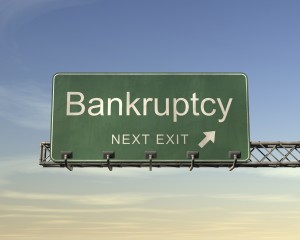Legal Institutions Are Not Prepared For More Student Loan Bankruptcies
Things must change, or law students and lawyers burdened by student debt might not feel truly empowered to declare bankruptcy to erase their student loans.
 I am sure that numerous readers of this column have already seen articles about how the Trump Administration may make it easier to discharge student loans in bankruptcy. Many of us already know that student debt is extremely difficult to erase through bankruptcy. This, of course makes sense, since student loans are typically not backed by any type of collateral, so it seems reasonable that this debt would be difficult to discharge.
I am sure that numerous readers of this column have already seen articles about how the Trump Administration may make it easier to discharge student loans in bankruptcy. Many of us already know that student debt is extremely difficult to erase through bankruptcy. This, of course makes sense, since student loans are typically not backed by any type of collateral, so it seems reasonable that this debt would be difficult to discharge.
However, this situation may soon change. Despite the fact that any type of bankruptcy has a number of disadvantages, many people have already reached out to me expressing their interest in the prospect of discharging student loans through bankruptcy. As discussed at length on my own website, I usually suggest that individuals work side hustles to help pay off student debt or look into income-driven repayment options to ease the burdens of student loans. However, for some student debt borrowers, bankruptcy might be the most appropriate strategy. Nevertheless, in order to fully empower lawyers and law students to discharge student loans through bankruptcy, important reforms need to be made by various institutions within the legal profession.
State bars have traditionally taken a dim view of bankruptcy. Indeed, I am sure many of you remember being asked about debts and bankruptcies during the character and fitness process to be admitted to the bar. The rationale behind this position is that financial responsibility is important in the legal profession, since lawyers are routinely charged with safeguarding client money and funds entrusted to lawyers when they serve in fiduciary capacities. People who declare bankruptcy allegedly might not have the financial responsibility necessary to be attorneys, and this is why bankruptcies are routinely asked about during the bar admissions process.

The Business Case For AI At Your Law Firm

If it becomes easier to discharge student loans in bankruptcy, then state bars must follow suit and relax their concerns about bankruptcies during the character and fitness process Unless state bars make this change, law students and lawyers burdened by student debt might not feel truly empowered to declare bankruptcy to erase their student loans.
It is easy to see how a bankruptcy filed to discharge student debt is different than bankruptcies based on other financial issues. Many individuals find themselves burdened by massive amounts of student debt not because of financial irresponsibility on the part of the borrower, but due to irresponsibility by institutions within the legal profession. Indeed, numerous people borrowed massive amounts of student loans based on inflated job statistics and unrealistic notions about the legal profession. Many of the watchdog groups tasked with policing law schools did a bad job of ensuring that law schools were transparent and would adequately prepare law students for the bar exam and their careers. As a result, it would be unfair for state bars to judge individuals who declared bankruptcy to discharge student debt.
Other parts of the legal profession will also have to alter their views about bankruptcy in order to fully empower individuals to erase their student loans through bankruptcy. Bankruptcy is typically asked about when individuals apply for certain jobs, especially in the public sector. Indeed, bankruptcy is usually a concern for jobs that require a security clearance, since financial responsibility is necessary for people who handle sensitive information. Furthermore, bankruptcy can impact one’s ability to obtain malpractice insurance, and has other impacts on one’s legal career.
In order to fully empower individuals to use changes in the bankruptcy laws to discharge student loans, employers will have to change their practices as well. Notions about financial responsibility will need to be reassessed, since declaring bankruptcy to obtain student debt relief does not necessarily mean that someone is financially irresponsible. Along with changing rules about bankruptcy, the government should also change standards governing security clearances so that individuals who declare bankruptcy to discharge their student loans are not unduly impacted by their decision.
Sponsored

Legal AI: 3 Steps Law Firms Should Take Now

Is The Future Of Law Distributed? Lessons From The Tech Adoption Curve

Navigating Financial Success by Avoiding Common Pitfalls and Maximizing Firm Performance

Early Adopters Of Legal AI Gaining Competitive Edge In Marketplace
In addition, informational resources will also need to be made available to assist borrowers who might consider declaring bankruptcy to discharge their student loans. Bankruptcy is different than refinancing, applying for income-based repayment, or employing any other strategy to manage student debt. Indeed, unlike these other options, bankruptcy can affect your vocational decisions and can impact your life in a number of important ways. It might take some time to fully evaluate the effects of discharging student debt in bankruptcy, and until this information is available, the legal profession is not yet prepared for changes in bankruptcy rules that might make it easier to discharge student debt.
It is unclear if bankruptcy rules will actually change so that it is easier to discharge student loans in bankruptcy. Nevertheless, if such reforms are made, bankruptcy could be a viable option for a number of student debt borrowers. However, if the bankruptcy rules are revised, institutions within the legal profession will also need to change in order empower individuals to fully benefit from these reforms.
 Jordan Rothman is the founder of Student Debt Diaries, a personal finance website discussing how he paid off all $197,890.20 of his college and law school student loans over 46 months of his late 20s. You can reach him at Jordan@studentdebtdiaries.com.
Jordan Rothman is the founder of Student Debt Diaries, a personal finance website discussing how he paid off all $197,890.20 of his college and law school student loans over 46 months of his late 20s. You can reach him at Jordan@studentdebtdiaries.com.
Sponsored

The Business Case For AI At Your Law Firm









